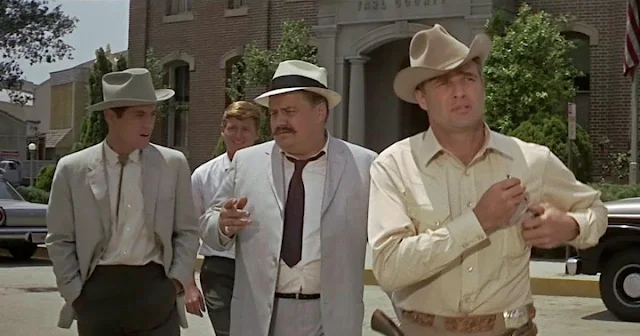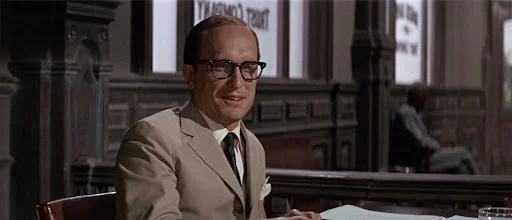Bad movies are often fun to watch anyway, and most of the people involved with The Chase, including director Arthur Penn, screenwriter Lillian Hellman, and star Marlon Brando, agreed that it was a bad movie. Brando let his opinion show, giving a sluggish performance that validates the old criticism that he mumbled his lines. Hellman had her script taken away and rewritten, and Penn struggled to deal with an ill-conceived project. The chief interest the film generates today is seeing actors like Jane Fonda, Robert Redford, and Robert Duvall on the brink of major stardom. There's a good deal of miscasting, including E.G. Mashall as the boss of a small town that seems to be in Texas or Louisiana. Marshall lacks the ruthless aura that the character needs. Angie Dickinson is wasted as the loving and dutiful wife of the town sheriff played by Brando. And Redford feels out of place in the role of Bubber Reeves, the town bad boy who escapes from prison (it's never quite clear what he did to be sent there) and stirs a manhunt, a lynch mob, and a conflagration in a junkyard. The town itself is a hotbed where everyone sleeps with everyone else's spouse and goes orgiastic on the Saturday night when the news of Bubber's escape breaks. It's a silly and lurid movie, but a little too long to be entertainingly bad.
A blog formerly known as Bookishness / By Charles Matthews
"Dazzled by so many and such marvelous inventions, the people of Macondo ... became indignant over the living images that the prosperous merchant Bruno Crespi projected in the theater with the lion-head ticket windows, for a character who had died and was buried in one film and for whose misfortune tears had been shed would reappear alive and transformed into an Arab in the next one. The audience, who had paid two cents apiece to share the difficulties of the actors, would not tolerate that outlandish fraud and they broke up the seats. The mayor, at the urging of Bruno Crespi, explained in a proclamation that the cinema was a machine of illusions that did not merit the emotional outbursts of the audience. With that discouraging explanation many ... decided not to return to the movies, considering that they already had too many troubles of their own to weep over the acted-out misfortunes of imaginary beings."--Gabriel García Márquez, One Hundred Years of Solitude
Search This Blog
Showing posts with label Robert Redford. Show all posts
Showing posts with label Robert Redford. Show all posts
Friday, July 26, 2024
The Chase (Arthur Penn, 1966)
Cast: Marlon Brando, Jane Fonda, Robert Redford, E.G. Marshall, Angie Dickinson, Janice Rule, Miriam Hopkins, Martha Hyer, Richard Bradford, Robert Duvall, James Fox, Diana Hyland, Henry Hull, Jocelyn Brando. Screenplay: Lillian Hellman, based on a novel by Horton Foote. Cinematography: Joseph LaShelle. Production design: Richard Day. Film editing: Gene Milford. Music: John Barry.
Saturday, July 4, 2020
Inside Daisy Clover (Robert Mulligan, 1965)
 |
| Natalie Wood and Robert Redford in Inside Daisy Clover |
As a satire on Hollywood and the star system, Inside Daisy Clover occasionally feels slack and uncertain. That may be because it was adapted by Gavin Lambert from his own novel, and authors are sometimes not the best judges of which parts of their books to transfer to film. There seem to be characters in the movie who haven't been given as much to do as their prominence suggests, such as Daisy's sister Gloria (Betty Harford), or Baines (Roddy McDowall), the assistant to the studio head, a role more generously cast than the function of the character in the story deserves. But I think a major problem stems from when the movie was made: in the mid-1960s, when the Production Code was on its last legs, and before films like Easy Rider (Dennis Hopper, 1969) and Midnight Cowboy (John Schlesinger, 1969) showed filmmakers what they could get away with. So although Inside Daisy Clover shook free of the Code's strictures against homosexuality and let Robert Redford's character, Wade Lewis, be revealed as gay (or, in a departure from the book, bisexual), you can still feel that people in the film aren't using the kind of verboten language that they would have in real life. Once, for example, Daisy (Natalie Wood) says "damn" and is reproved by her mother (Ruth Gordon) for using "those four letter words." When Daisy scrawls in anger on a wall, you expect stronger language than her graffiti contains. Lambert and director Robert Mulligan are chafing at the restrictions but haven't been given the go-ahead to take the film as far as it wants to go, so there's a kind of tonal dithering -- lunges in the direction of black comedy, as in Daisy's suicide attempt, that fall short of the mark.
Wednesday, May 1, 2019
All the President's Men (Alan J. Pakula, 1976)
All the President's Men (Alan J. Pakula, 1976)
Cast: Robert Redford, Dustin Hoffman, Jason Robards, Jack Warden, Martin Balsam, Hal Holbrook, Jane Alexander, Meredith Baxter, Stephen Collins, Ned Beatty, Robert Walden. Screenplay: William Goldman, based on a book by Carl Bernstein and Bob Woodward. Cinematography: Gordon Willis. Production design: George Jenkins. Film editing: Robert L. Wolfe. Music: David Shire.
Subscribe to:
Comments (Atom)


















